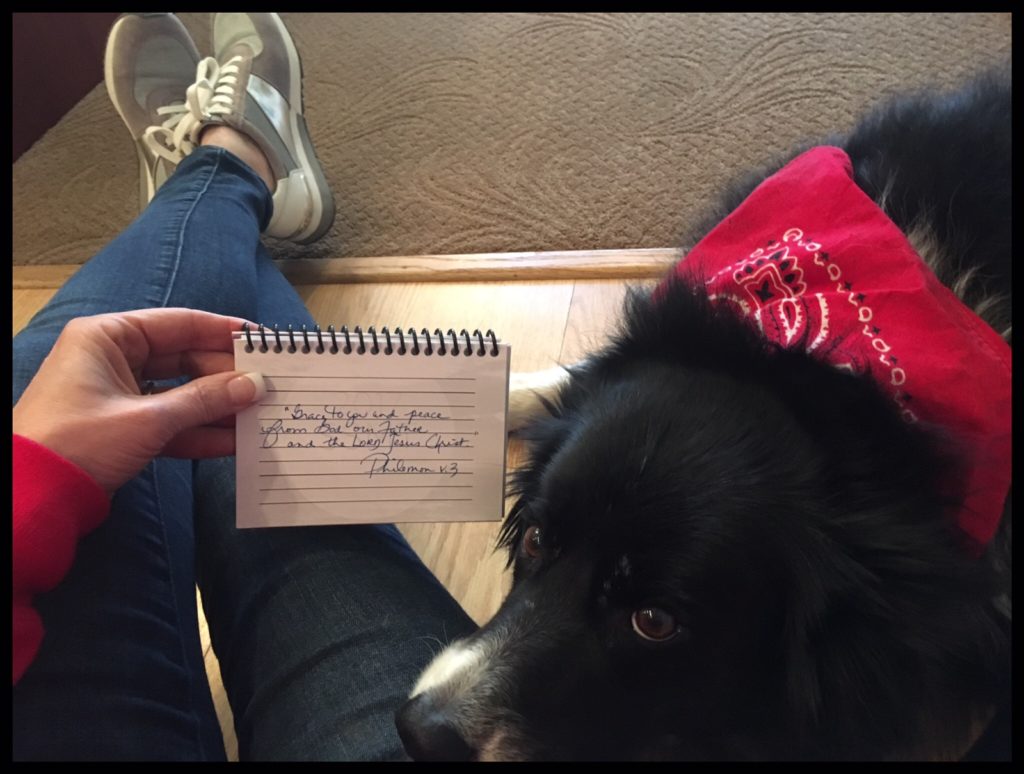In my Scripture reading early yesterday morning, I chased a rabbit trail that landed me in a cul de sac with Job 13. I got so preoccupied I was late for work then, once I got there, still couldn’t keep my thoughts from circling around that curb. In the corner shadow of more substantial themes, the Book of Job gives impressive credence to the adage, “With friends like these, who needs enemies?” God bless them, they started out well but time took its toll and the temptation to offer explanation for human suffering became intolerable. When in doubt, after all, what better coping skill could there be than dogmatism? To the reader’s measurable relief, chapter 13 marks the spot where Job indelicately invites his friends to shut up. Unroll the scroll to verse 5.
“Oh that you would keep silent, and it would be your wisdom!” Then a little further down to verse 13, “Let me have silence, and I will speak, and let come on me what may.”
The show stealer in the chapter is the temerarious declaration the pummeled mortal makes in reference to his God. “Though he slay me, yet will I trust in him.” (13:15 AV) The HCSB says it like a boxer spitting blood from a busted lip through broken teeth: “Even if He kills me, I will hope in Him.”
But one of the things I love best about Spirit-breathed Scripture is that the Spirit reserves the right to animate a passage that has never attracted our attention before. For me yesterday morning, it was the first half of the 12th verse. Job, to his friends:
“Your maxims are proverbs of ashes.”
For all we know the man made the statement sitting in a heap of ashes like he’d positioned himself in Job 2:8. Of course, it’s easy to miss the ashes in that early scene because we’re too disturbed by him scraping his loathsome sores with a piece of broken pottery. When these words come out of Job’s mouth in 13:12, one commentator suggested he may have gathered some ashes in his palm and blown them into the wind in case his observers were inclined to miss the point. Ashes symbolized loss, grief, mourning and death to the ancients and at times were the wares of sorrowful repentance. The idea probably germinated with God’s words to Adam after the fall in the Garden when death was born.
“For you are dust, and to dust you shall return.”
Mourners commonly practiced demonstrating their profound grief by wrapping their waists in skin-rawing sackcloth and covering their heads in ashes. At least it showed. Don’t you sometimes wish our shattered hearts would at least dignify our suffering enough to show up? Tamar, Mordecai and Daniel displayed their anguish with ashes but here’s the irony: so did Job’s three friends. Yep. At the very first glimpse of him.
And when they saw him from a distance, they did not recognize him. And they raised their voices and wept, and they tore their robes and sprinkled dust on their heads toward heaven. And they sat with him on the ground seven days and seven nights, and no one spoke a word to him, for they saw that his suffering was very great. (Job 2:12-13)
But then Job opened his mouth and released his lament and they opened theirs.
And their maxims were proverbs of ashes.
I never noticed the wording before because maxims had yet to be promoted to our primary means of communication. Shoot, a good maxim today could bring you a whopping ten thousand likes. We’ve developed such an appetite for maxims, we’re bored to oblivion by actual messages from our pastors. We demand twenty minutes of strung-together maxims or we’re staying home and surfing podcasts. Give us tweetables. Quotes we can stick on a picture and post.
And I’m neck deep in the middle of it splashing around in my floaties while people are down at the bottom of the lake drowning. This is not a rant for more meaningful maxims. It’s just a reminder to me today that my aphorisms don’t mean a flying flip in a frying world. Nobody’s likely to thank me in heaven for that life-changing tweet. I love Twitter. Good grief, I love all the things. And, man, do I ever appreciate a good aphorism. It’s fun. Quippy. Can even make people think.
For five seconds.
Mind you, five seconds is better than none. But let’s take it for what it is then get to the real business of ministering to the mournful. They are crowded around us, blinded by the darkness, flailing, feeling around in thin air for somebody’s warm-blooded hand. And sometimes the mournful is you. Me. Sometimes the mournful zips itself up in our ruddy skin and makes it hard to get out of bed. And, Good Lord, no wonder we’re depressed. We’ve turned social media into a spiritual discipline. We’ve made a diet of cheese puffs, bloating our souls with air and calling ourselves healthy.
Ashes.
The thing is, I can’t get the Oakland warehouse fire off my mind. That’s where this whole thing started. I don’t want to get it off my mind right away anyway. That community and those terror-stricken families will need prayer for a long time. I know that because my family has lived in the ashes of murderous flames for decades. I know that because the evening before the news broke out about the fire in Oakland, my husband brought up the fire in his childhood garage over supper with our daughters.
We know the story by heart. I knew it by our third date. Keith and his big brother were knee-high, plump-faced preschoolers playing in the garage when a slender river of gasoline rolled underneath the water heater and ignited. Both boys were burned. Both boys rushed to the hospital. Both admitted. Both treated for several days. Both desperately prayed for. Both were impossible to imagine living without. One went home with his mommy. The other went home with Jesus.
A couple of years ago, Keith and I were sitting with his parents at a picnic table on the porch of a burger joint we often frequented. The men were sitting on one side of the table and we women were facing them from the other. When Keith got up to fetch our order from the carry-out window, my father-in-law leaned across the table and, in a tone dripping with tenderness, said to me, “Baby, today is the anniversary of Duke’s death.”
My eyes immediately shot to my mother-in-law. She did not say a word. She couldn’t. Even all those years later. She reached in her pocket for a tissue and blotted her wet eyes. I can hardly write these words without doing the same. I hugged her, squeezed her hand, picked at my food like she did then sobbed all the way home. Every loss etches an absence. But tragedy threatens to carve an abyss.
Especially a fire. Its destructive force doesn’t just dent, cut or bruise. Fire has the capacity to consume. It has the capacity to take something teeming with life and vitality – a church, for instance, or a home or, God help us, a life – and reduce it to ashes. Something weighty into dust in the gust. I think maybe that’s what makes such vivid imagery of ash: its cold reduction of something to almost nothing.
Forgive me for being so graphic. I don’t do this often. But, the thing is, we are the Body of Christ commissioned to flesh Him out through the ministries of His Spirit to this graphic global darkness. We flip on our screens or open our feeds daily to news of tragedies somewhere on this aching orb. Unless we’ve let our hearts grow cold to shield us from the harsh elements, we shake our heads and shed some tears and at times drop faces to palms and sob. We summon Jesus to hold the hurting and to comfort them in a way that is otherworldly. In a way that is deeply personal because, if we possess a whiff of wisdom, we know that no two hearts process loss the same way. In the wording of Proverbs 14:10, each heart knows its own bitterness.
No two losses are exactly the same. And not all tragedies are equal. There is no one-size-fits-all remedy for the pain-ravaged.
Our maxims are not only a waste of breath. Of electronic space. They are offensive to the suffering. Sometimes even things we know to be true are better left unsaid for a long, long time. In the presence of those suffering, we say less and do more. We still our tongues and loose our hands. We mute our volume and vacuum their dens. We save our words then spill them like a dam breaking before God. Because He’s the only one whose feet don’t fail in a tidal wave of suffering. He’s the only one who really knows the whys and hows and wheres and whens. And He won’t tell us now. But He’ll tell us then.
Yesterday morning it was the word “ashes” that took me on that rabbit trail. I kept thinking about what I’d read in a news article about the first responders carefully, “reverently” removing the ashes from the Oakland warehouse. “Reverently.” That was the description the writer used and I appreciated it even if it made me want to wail. So I looked up every time ashes are found in the Scriptures. I found this among them.
The Spirit of the Lord God is upon me,
because the Lord has anointed me
to bring good news to the poor;
he has sent me to bind up the brokenhearted,
…to comfort all who mourn; to grant to those who mourn in Zion—
to give them a beautiful headdress instead of ashes.
(Isaiah 61:1,3)
This section had long-since been dear to me but that’s the beauty of research. That’s the beauty of looking to scholars God has equipped with spiritual gifts of knowledge. You learn something brand new. I’ll let Dr. J.N. Oswalt tell it to you the way he told it to me in New International Commentary on the Book of Isaiah: (emphasis his)
“In 60:17 the prophet promised the best (gold) for the better (bronze), but here the Servant/Messiah promises the best for the worst…The picture of the mourner, with ashes on the head, wrapped in sackcloth, with a spirit crushed by despair, is replaced by the picture of a party goer with a beautiful headdress, smelling of costly oil, and wearing a garment of praise.”[1]
There is a wordplay in the Hebrew that makes it especially spectacular. The peʾēr, “beautiful headdress,” replaces ʾēper, “dust.”[2]
If anybody at all is still reading, I’m almost done. Just take this part of Isaiah 61 in one more time.
to grant to those who mourn in Zion—
to give them a beautiful headdress instead of ashes,
the oil of gladness instead of mourning, the garment of praise instead of a faint spirit.[3]
Instead of, instead of, instead of.
I want to be there on the scene for at least a few thousand rounds of “instead of.” Sometimes we see those things happen right here in this earthly realm but other times it’s too late. Their tragedies took their lives. I want to see Jesus replace the ashes on the heads of the grief stricken in this lifetime with the headdresses of deliriously happy party-goers. Yes, party-goers. Don’t even try to talk me out of that. I want some parties when I get to heaven. I want to see some people shake a leg who’d suffered paralysis here. People dine in style who’d starved to death in squalor here. I want to see Jesus unwind the awful sackcloth from those who’d mourned on this earth and spin them around in garments of praise.
That’s what I want. I want to see my mother-in-law in a party hat laughing her head off. And I want to meet my brother-in-law. And sit cozy by a fire and never get burned.
Because this life is the hint of hell for a whole lot of people. But there is a God in heaven weaving eternity from an endless string of insteads. No proverbs of ashes from His lips. Just straight up promises.
[1] Oswalt, J. N. (1998). The Book of Isaiah, Chapters 40–66 (p. 567). Grand Rapids, MI: Wm. B. Eerdmans Publishing Co.
[2] Oswalt, J. N. (1998). The Book of Isaiah, Chapters 40–66. Grand Rapids, MI: Wm. B. Eerdmans Publishing Co.
Leave a comment here.
| Share with Others:











